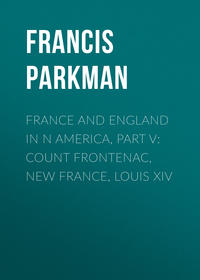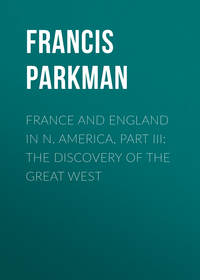 полная версия
полная версияFrance and England in North America, Part VI : Montcalm and Wolfe
During eight days he and his party coasted the northern shore of Lake Ontario, with various incidents, such as an encounter between his dog Cerberus and a wolf, to the disadvantage of the latter, and the meeting with "a very fine negro of twenty-two years, a fugitive from Virginia." On the twenty-sixth of June they reached the new fort of Toronto, which offered a striking contrast to their last stopping-place. "The wine here is of the best; there is nothing wanting in this fort; everything is abundant, fine, and good." There was reason for this. The Northern Indians were flocking with their beaver-skins to the English of Oswego; and in April, 1749, an officer named Portneuf had been sent with soldiers and workmen to build a stockaded trading-house at Toronto, in order to intercept them,—not by force, which would have been ruinous to French interests, but by a tempting supply of goods and brandy.35 Thus the fort was kept well stocked, and with excellent effect. Piquet found here a band of Mississagas, who would otherwise, no doubt, have carried their furs to the English. He was strongly impelled to persuade them to migrate to La Présentation; but the Governor had told him to confine his efforts to other tribes; and lest, he says, the ardor of his zeal should betray him to disobedience, he reimbarked, and encamped six leagues from temptation.
Two days more brought him to Niagara, where he was warmly received by the commandant, the chaplain, and the storekeeper,—the triumvirate who ruled these forest outposts, and stood respectively for their three vital principles, war, religion, and trade. Here Piquet said mass; and after resting a day, set out for the trading-house at the portage of the cataract, recently built, like Toronto, to stop the Indians on their way to Oswego.36 Here he found Joncaire, and here also was encamped a large band of Senecas; though, being all drunk, men, women, and children, they were in no condition to receive the Faith, or appreciate the temporal advantages that attended it. On the next morning, finding them partially sober, he invited them to remove to La Présentation; "but as they had still something left in their bottles, I could get no answer till the following day." "I pass in silence," pursues the missionary, "an infinity of talks on this occasion. Monsieur de Joncaire forgot nothing that could help me, and behaved like a great servant of God and the King. My recruits increased every moment. I went to say my breviary while my Indians and the Senecas, without loss of time, assembled to hold a council with Monsieur de Joncaire." The result of the council was an entreaty to the missionary not to stop at Oswego, lest evil should befall him at the hands of the English. He promised to do as they wished, and presently set out on his return to Fort Niagara, attended by Joncaire and a troop of his new followers. The journey was a triumphal progress. "Whenever was passed a camp or a wigwam, the Indians saluted me by firing their guns, which happened so often that I thought all the trees along the way were charged with gunpowder; and when we reached the fort, Monsieur de Becancour received us with great ceremony and the firing of cannon, by which my savages were infinitely flattered."
His neophytes were gathered into the chapel for the first time in their lives, and there rewarded with a few presents. He now prepared to turn homeward, his flock at the mission being left in his absence without a shepherd; and on the sixth of July he embarked, followed by a swarm of canoes. On the twelfth they stopped at the Genesee, and went to visit the Falls, where the city of Rochester now stands. On the way, the Indians found a populous resort of rattlesnakes, and attacked the gregarious reptiles with great animation, to the alarm of the missionary, who trembled for his bare-legged retainers. His fears proved needless. Forty-two dead snakes, as he avers, requited the efforts of the sportsmen, and not one of them was bitten. When he returned to camp in the afternoon he found there a canoe loaded with kegs of brandy. "The English," he says, "had sent it to meet us, well knowing that this was the best way to cause disorder among my new recruits and make them desert me. The Indian in charge of the canoe, who had the look of a great rascal, offered some to me first, and then to my Canadians and Indians. I gave out that it was very probably poisoned, and immediately embarked again."
He encamped on the fourteenth at Sodus Bay, and strongly advises the planting of a French fort there. "Nevertheless," he adds, "it would be still better to destroy Oswego, and on no account let the English build it again." On the sixteenth he came in sight of this dreaded post. Several times on the way he had met fleets of canoes going thither or returning, in spite of the rival attractions of Toronto and Niagara. No English establishment on the continent was of such ill omen to the French. It not only robbed them of the fur-trade, by which they lived, but threatened them with military and political, no less than commercial, ruin. They were in constant dread lest ships of war should be built here, strong enough to command Lake Ontario, thus separating Canada from Louisiana, and cutting New France asunder. To meet this danger, they soon after built at Fort Frontenac a large three-masted vessel, mounted with heavy cannon; thus, as usual, forestalling their rivals by promptness of action.37 The ground on which Oswego stood was claimed by the Province of New York, which alone had control of it; but through the purblind apathy of the Assembly, and their incessant quarrels with the Governor, it was commonly left to take care of itself. For some time they would vote no money to pay the feeble little garrison; and Clinton, who saw the necessity of maintaining it, was forced to do so on his own personal credit.38 "Why can't your Governor and your great men [the Assembly] agree?" asked a Mohawk chief of the interpreter, Conrad Weiser.39
Piquet kept his promise not to land at the English fort; but he approached in his canoe, and closely observed it. The shores, now covered by the city of Oswego, were then a desolation of bare hills and fields, studded with the stumps of felled trees, and hedged about with a grim border of forests. Near the strand, by the mouth of the Onondaga, were the houses of some of the traders; and on the higher ground behind them stood a huge block-house with a projecting upper story. This building was surrounded by a rough wall of stone, with flankers at the angles, forming what was called the fort.40 Piquet reconnoitred it from his canoe with the eye of a soldier. "It is commanded," he says, "on almost every side; two batteries, of three twelve-pounders each, would be more than enough to reduce it to ashes." And he enlarges on the evils that arise from it. "It not only spoils our trade, but puts the English into communication with a vast number of our Indians, far and near. It is true that they like our brandy better than English rum; but they prefer English goods to ours, and can buy for two beaver-skins at Oswego a better silver bracelet than we sell at Niagara for ten."
The burden of these reflections was lightened when he approached Fort Frontenac. "Never was reception more solemn. The Nipissings and Algonkins, who were going on a war-party with Monsieur Belêtre, formed a line of their own accord, and saluted us with three volleys of musketry, and cries of joy without end. All our little bark vessels replied in the same way. Monsieur de Verchères and Monsieur de Valtry ordered the cannon of the fort to be fired; and my Indians, transported with joy at the honor done them, shot off their guns incessantly, with cries and acclamations that delighted everybody." A goodly band of recruits joined him, and he pursued his voyage to La Présentation, while the canoes of his proselytes followed in a swarm to their new home; "that establishment"—thus in a burst of enthusiasm he closes his Journal—"that establishment which I began two years ago, in the midst of opposition; that establishment which may be regarded as a key of the colony; that establishment which officers, interpreters, and traders thought a chimæra,—that establishment, I say, forms already a mission of Iroquois savages whom I assembled at first to the number of only six, increased last year to eighty-seven, and this year to three hundred and ninety-six, without counting more than a hundred and fifty whom Monsieur Chabert de Joncaire is to bring me this autumn. And I certify that thus far I have received from His Majesty—for all favor, grace, and assistance—no more than a half pound of bacon and two pounds of bread for daily rations; and that he has not yet given a pin to the chapel, which I have maintained out of my own pocket, for the greater glory of my masters, God and the King."41
In his late journey he had made the entire circuit of Lake Ontario. Beyond lay four other inland oceans, to which Fort Niagara was the key. As that all-essential post controlled the passage from Ontario to Erie, so did Fort Detroit control that from Erie to Huron, and Fort Michillimackinac that from Huron to Michigan; while Fort Ste. Marie, at the outlet of Lake Superior, had lately received a garrison, and changed from a mission and trading-station to a post of war.42 This immense extent of inland navigation was safe in the hands of France so long as she held Niagara. Niagara lost, not only the lakes, but also the Valley of the Ohio was lost with it. Next in importance was Detroit. This was not a military post alone, but also a settlement; and, except the hamlets about Fort Chartres, the only settlement that France owned in all the West. There were, it is true, but a few families; yet the hope of growth seemed good; for to such as liked a wilderness home, no spot in America had more attraction. Father Bonnecamp stopped here for a day on his way back from the expedition of Céloron. "The situation," he says, "is charming. A fine river flows at the foot of the fortifications; vast meadows, asking only to be tilled, extend beyond the sight. Nothing can be more agreeable than the climate. Winter lasts hardly two months. European grains and fruits grow here far better than in many parts of France. It is the Touraine and Beauce of Canada."43 The white flag of the Bourbons floated over the compact little palisaded town, with its population of soldiers and fur-traders; and from the block-houses which served as bastions, one saw on either hand the small solid dwellings of the habitants, ranged at intervals along the margin of the water; while at a little distance three Indian villages—Ottawa, Pottawattamie, and Wyandot—curled their wigwam smoke into the pure summer air.44
When Céloron de Bienville returned from the Ohio, he went, with a royal commission, sent him a year before, to command at Detroit.45 His late chaplain, the very intelligent Father Bonnecamp, speaks of him as fearless, energetic, and full of resource; but the Governor calls him haughty and insubordinate. Great efforts were made, at the same time, to build up Detroit as a centre of French power in the West. The methods employed were of the debilitating, paternal character long familiar to Canada. All emigrants with families were to be carried thither at the King's expense; and every settler was to receive in free gift a gun, a hoe, an axe, a ploughshare, a scythe, a sickle, two augers, large and small, a sow, six hens, a cock, six pounds of powder, and twelve pounds of lead; while to these favors were added many others. The result was that twelve families were persuaded to go, or about a twentieth part of the number wanted.46 Detroit was expected to furnish supplies to the other posts for five hundred miles around, control the neighboring Indians, thwart English machinations, and drive off English interlopers.
La Galissonière no longer governed Canada. He had been honorably recalled, and the Marquis de la Jonquière sent in his stead.47 La Jonquière, like his predecessor, was a naval officer of high repute; he was tall and imposing in person, and of undoubted capacity and courage; but old and, according to his enemies, very avaricious.48 The Colonial Minister gave him special instructions regarding that thorn in the side of Canada, Oswego. To attack it openly would be indiscreet, as the two nations were at peace; but there was a way of dealing with it less hazardous, if not more lawful. This was to attack it vicariously by means of the Iroquois. "If Abbé Piquet succeeds in his mission," wrote the Minister to the new Governor, "we can easily persuade these savages to destroy Oswego. This is of the utmost importance; but act with great caution."49 In the next year the Minister wrote again: "The only means that can be used for such an operation in time of peace are those of the Iroquois. If by making these savages regard such an establishment [Oswego] as opposed to their liberty, and, so to speak, a usurpation by which the English mean to get possession of their lands, they could be induced to undertake its destruction, an operation of the sort is not to be neglected; but M. le Marquis de la Jonquière should feel with what circumspection such an affair should be conducted, and he should labor to accomplish it in a manner not to commit himself."50 To this La Jonquière replies that it will need time; but that he will gradually bring the Iroquois to attack and destroy the English post. He received stringent orders to use every means to prevent the English from encroaching, but to act towards them at the same time "with the greatest politeness."51 This last injunction was scarcely fulfilled in a correspondence which he had with Clinton, governor of New York, who had written to complain of the new post at the Niagara portage as an invasion of English territory, and also of the arrest of four English traders in the country of the Miamis. Niagara, like Oswego, was in the country of the Five Nations, whom the treaty of Utrecht declared "subject to the dominion of Great Britain."52 This declaration, preposterous in itself, was binding on France, whose plenipotentiaries had signed the treaty. The treaty also provided that the subjects of the two Crowns "shall enjoy full liberty of going and coming on account of trade," and Clinton therefore demanded that La Jonquière should disavow the arrest of the four traders and punish its authors. The French Governor replied with great asperity, spurned the claim that the Five Nations were British subjects, and justified the arrest.53 He presently went further. Rewards were offered by his officers for the scalps of Croghan and of another trader named Lowry.54 When this reached the ears of William Johnson, on the Mohawk, he wrote to Clinton in evident anxiety for his own scalp: "If the French go on so, there is no man can be safe in his own house; for I can at any time get an Indian to kill any man for a small matter. Their going on in that manner is worse than open war."
The French on their side made counter-accusations. The captive traders were examined on oath before La Jonquière, and one of them, John Patton, is reported to have said that Croghan had instigated Indians to kill Frenchmen.55 French officials declared that other English traders were guilty of the same practices; and there is very little doubt that the charge was true.
The dispute with the English was not the only source of trouble to the Governor. His superiors at Versailles would not adopt his views, and looked on him with distrust. He advised the building of forts near Lake Erie, and his advice was rejected. "Niagara and Detroit," he was told, "will secure forever our communications with Louisiana."56 "His Majesty," again wrote the Colonial Minister, "thought that expenses would diminish after the peace; but, on the contrary, they have increased. There must be great abuses. You and the Intendant must look to it."57 Great abuses there were; and of the money sent to Canada for the service of the King the larger part found its way into the pockets of peculators. The colony was eaten to the heart with official corruption; and the centre of it was François Bigot, the intendant. The Minister directed La Jonquière's attention to certain malpractices which had been reported to him; and the old man, deeply touched, replied: "I have reached the age of sixty-six years, and there is not a drop of blood in my veins that does not thrill for the service of my King. I will not conceal from you that the slightest suspicion on your part against me would cut the thread of my days."58
Perplexities increased; affairs in the West grew worse and worse. La Jonquière ordered Céloron to attack the English at Pickawillany; and Céloron could not or would not obey. "I cannot express," writes the Governor, "how much this business troubles me; it robs me of sleep; it makes me ill." Another letter of rebuke presently came from Versailles. "Last year you wrote that you would soon drive the English from the Ohio; but private letters say that you have done nothing. This is deplorable. If not expelled, they will seem to acquire a right against us. Send force enough at once to drive them off, and cure them of all wish to return."59 La Jonquière answered with bitter complaints against Céloron, and then begged to be recalled. His health, already shattered, was ruined by fatigue and vexation; and he took to his bed. Before spring he was near his end.60 It is said that, though very rich, his habits of thrift so possessed his last hours that, seeing wax-candles burning in his chamber, he ordered others of tallow to be brought instead, as being good enough to die by. Thus frugally lighted on its way, his spirit fled; and the Baron de Longueuil took his place till a new governor should arrive.
Sinister tidings came thick from the West. Raymond, commandant at the French fort on the Maumee, close to the centre of intrigue, wrote: "My people are leaving me for Detroit. Nobody wants to stay here and have his throat cut. All the tribes who go to the English at Pickawillany come back loaded with gifts. I am too weak to meet the danger. Instead of twenty men, I need five hundred…. We have made peace with the English, yet they try continually to make war on us by means of the Indians; they intend to be masters of all this upper country. The tribes here are leaguing together to kill all the French, that they may have nobody on their lands but their English brothers. This I am told by Coldfoot, a great Miami chief, whom I think an honest man, if there is any such thing among Indians…. If the English stay in this country we are lost. We must attack, and drive them out." And he tells of war-belts sent from tribe to tribe, and rumors of plots and conspiracies far and near.
Without doubt, the English traders spared no pains to gain over the Indians by fair means or foul; sold them goods at low rates, made ample gifts, and gave gunpowder for the asking. Saint-Ange, who commanded at Vincennes, wrote that a storm would soon burst on the heads of the French. Joncaire reported that all the Ohio Indians sided with the English. Longueuil informed the Minister that the Miamis had scalped two soldiers; that the Piankishaws had killed seven Frenchmen; and that a squaw who had lived with one of the slain declared that the tribes of the Wabash and Illinois were leaguing with the Osages for a combined insurrection. Every letter brought news of murder. Small-pox had broken out at Detroit. "It is to be wished," says Longueuil, "that it would spread among our rebels; it would be fully as good as an army…. We are menaced with a general outbreak, and even Toronto is in danger…. Before long the English on the Miami will gain over all the surrounding tribes, get possession of Fort Chartres, and cut our communications with Louisiana."61
The moving spirit of disaffection was the chief called Old Britain, or the Demoiselle, and its focus was his town of Pickawillany, on the Miami. At this place it is said that English traders sometimes mustered to the number of fifty or more. "It is they," wrote Longueuil, "who are the instigators of revolt and the source of all our woes."62 Whereupon the Colonial Minister reiterated his instructions to drive them off and plunder them, which he thought would "effectually disgust them," and bring all trouble to an end.63
La Jonquière's remedy had been more heroic, for he had ordered Céloron to attack the English and their red allies alike; and he charged that officer with arrogance and disobedience because he had not done so. It is not certain that obedience was easy; for though, besides the garrison of regulars, a strong body of militia was sent up to Detroit to aid the stroke,64 the Indians of that post, whose co-operation was thought necessary, proved half-hearted, intractable, and even touched with disaffection. Thus the enterprise languished till, in June, aid came from another quarter. Charles Langlade, a young French trader married to a squaw at Green Bay, and strong in influence with the tribes of that region, came down the lakes from Michillimackinac with a fleet of canoes manned by two hundred and fifty Ottawa and Ojibwa warriors; stopped a while at Detroit; then embarked again, paddled up the Maumee to Raymond's fort at the portage, and led his greased and painted rabble through the forest to attack the Demoiselle and his English friends. They approached Pickawillany at about nine o'clock on the morning of the twenty-first. The scared squaws fled from the cornfields into the town, where the wigwams of the Indians clustered about the fortified warehouse of the traders. Of these there were at the time only eight in the place. Most of the Indians also were gone on their summer hunt, though the Demoiselle remained with a band of his tribesmen. Great was the screeching of war-whoops and clatter of guns. Three of the traders were caught outside the fort. The remaining five closed the gate, and stood on their defence. The fight was soon over. Fourteen Miamis were shot down, the Demoiselle among the rest. The five white men held out till the afternoon, when three of them surrendered, and two, Thomas Burney and Andrew McBryer, made their escape. One of the English prisoners being wounded, the victors stabbed him to death. Seventy years of missionaries had not weaned them from cannibalism, and they boiled and eat the Demoiselle.65
The captive traders, plundered to the skin, were carried by Langlade to Duquesne, the new governor, who highly praised the bold leader of the enterprise, and recommended him to the Minister for such reward as befitted one of his station. "As he is not in the King's service, and has married a squaw, I will ask for him only a pension of two hundred francs, which will flatter him infinitely."
The Marquis Duquesne, sprung from the race of the great naval commander of that name, had arrived towards midsummer; and he began his rule by a general review of troops and militia. His lofty bearing offended the Canadians; but he compelled their respect, and, according to a writer of the time, showed from the first that he was born to command. He presently took in hand an enterprise which his predecessor would probably have accomplished, had the Home Government encouraged him. Duquesne, profiting by the infatuated neglect of the British provincial assemblies, prepared to occupy the upper waters of the Ohio, and secure the passes with forts and garrisons. Thus the Virginian and Pennsylvanian traders would be debarred all access to the West, and the tribes of that region, bereft henceforth of English guns, knives, hatchets, and blankets, English gifts and English cajoleries, would be thrown back to complete dependence on the French. The moral influence, too, of such a movement would be incalculable; for the Indian respects nothing so much as a display of vigor and daring, backed by force. In short, the intended enterprise was a master-stroke, and laid the axe to the very root of disaffection. It is true that, under the treaty, commissioners had been long in session at Paris to settle the question of American boundaries; but there was no likelihood that they would come to agreement; and if France would make good her Western claims, it behooved her, while there was yet time, to prevent her rival from fastening a firm grasp on the countries in dispute.
Yet the Colonial Minister regarded the plan with distrust. "Be on your guard," he wrote to Duquesne, "against new undertakings; private interests are generally at the bottom of them. It is through these that new posts are established. Keep only such as are indispensable, and suppress the others. The expenses of the colony are enormous; and they have doubled since the peace." Again, a little later: "Build on the Ohio such forts as are absolutely necessary, but no more. Remember that His Majesty suspects your advisers of interested views."66







